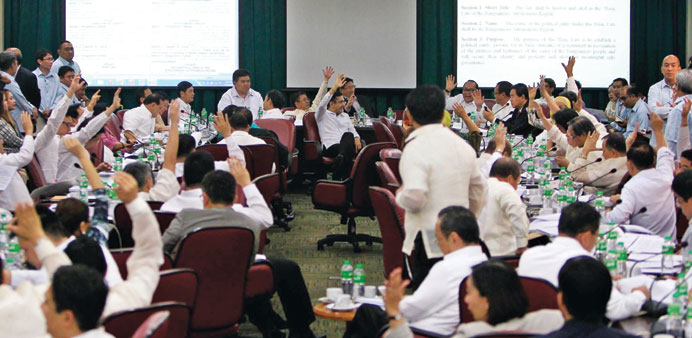Members of the Adhoc Committee on the Bangsamoro Basic Law led by Chairman and Cagayan De Oro representative Rufus Rodriguez vote on amendments of the chairman’s working draft of the BBL during a hearing at the House of Representatives in Quezon City on Monday.
By William B Depasupil/Manila Times
Manila Auxiliary Bishop Broderick Pabillo yesterday called on President Benigno Aquino not to pressure lawmakers into approving the controversial Bangsamoro Basic Law (BBL) in haste, so as not to further complicate the issue.
At the same time, Pabillo also called on the legislators to speak out their minds and not allow themselves to be used or dictated upon by Malacanang.
“We need a law to achieve peace but it should be effective and acceptable to all and not something that will just create more problems in the future,” the chairman of the Catholic Bishops’ Conference of the Philippines’ (CBCP) Public Affairs Committee said.
Sen. Ferdinand Marcos Jr, who heads the Senate local government committee deliberating on the draft BBL, also asked Malacanang not to impose “political deadlines” for passage of the bill.
Reacting to the call, Malacanang, also yesterday, denied claims that the Aquino administration was railroading the passage of the draft BBL.
In a text message to reporters, Communications Secretary Herminio Coloma Jr said that both the Senate and the House of Representatives had been deliberating on the controversial measure for months now.
“The draft BBL was submitted to the Congress in the third quarter of 2014…isn’t this clear that the issue has long been being discussed in public?” he asked.
Pabillo said a deeper study and analysis of the proposed law is necessary because the BBL will not only affect Mindanao but the entire country as well.
Congress has given itself until June to pass the draft law.
The BBL’s enactment into law would pave the way for the establishment of a Bangsamoro Autonomous Region in place of the existing Autonomous Region in Muslim Mindanao or ARMM.
Pabillo pointed out that rushing the BBL to meet the June deadline would not result in peace, but only complicate matters.
He said all stakeholders must be given the chance to voice their opinions.
“Many people in Mindanao don’t even know what the implications of BBL would be to them,” Pabillo added.
Earlier, Fr Jerome Secillano, executive secretary, CBCP Permanent Committee on Public Affairs, expressed his belief that enactment into law of the BBL and subsequent creation of a Bangsamoro Autonomous Region would only create more troubles, not peace, as envisioned by its framers.
“The worse that can happen is to make Mindanao a haven of revolutionary Muslim groups, both local and international, that harbour the aspiration of establishing a caliphate through terror,” Secillano said.
“These (rebel) groups operate through a network. The ties that bind them are soaked in blood. They may employ different means or strategies but surely they are motivated by the same goal, that of self-determination and eventually independence,” he pointed out.
Secillano criticised a provision in the draft BBL, which states that “the Bangsamoro government shall have the primary responsibility over public order and safety, leaving the central government with its Armed Forces and National Police safeguarding only the region’s external security.”
The BBL also requires the central government to
“co-ordinate and co-operate” with the Bangsamoro government before arresting dubious characters in the region.
Secillano raised doubts about this provision, noting that the arrest of wanted criminals can hardly be done even with “co-ordination and co-operation” between both parties.
“The government is seemingly held hostage to deliver without any substantial changes and in toto the draft BBL…Peace, under (this proposed law), would seem to be a mere consequence of power, financial stability and the ‘autonomous’ government granted to the Bangsamoro under most probably the MILF (Moro Islamic Liberation Front),” he said.
“After reading the draft, though, I got the impression that the Bangsamoro’s right to self-rule seems to be favoured, with the central government maybe consciously and slowly allowing the island of Mindanao to slip from its grip,” Secillano noted.

